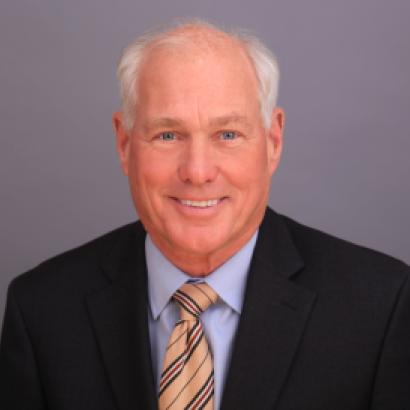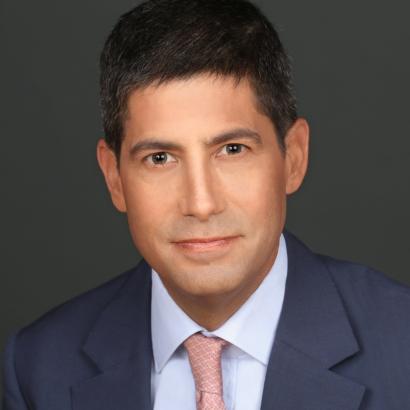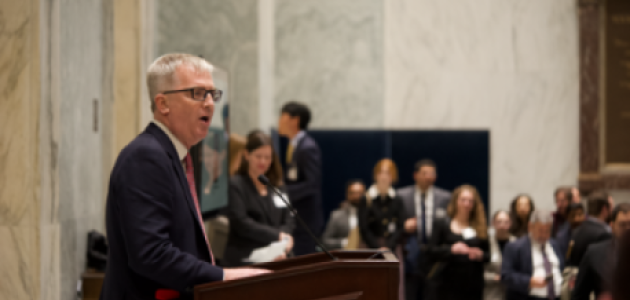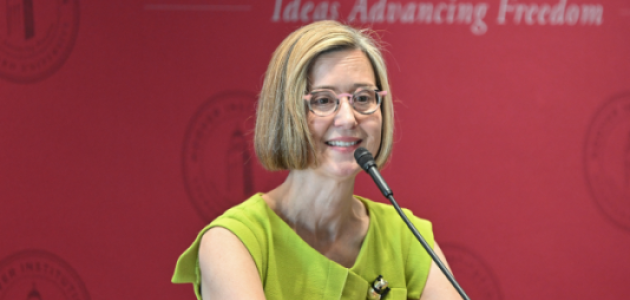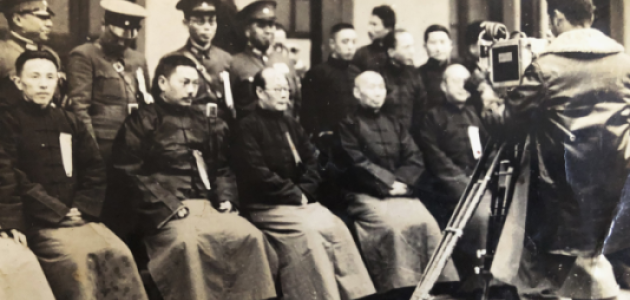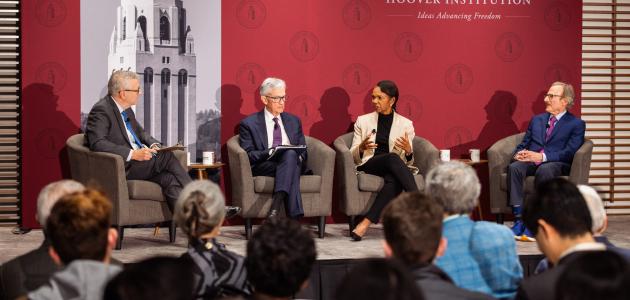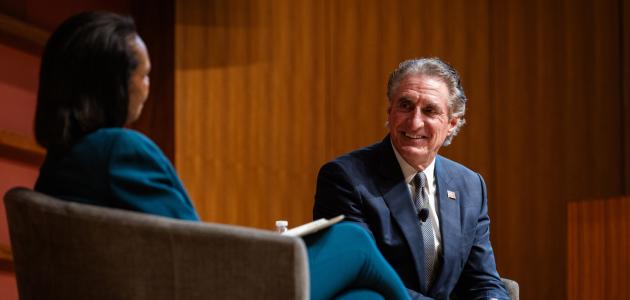In this Q&A, fellows John F. Cogan and Kevin Warsh describe their recently released paper, “Reinvigorating Economic Governance: Advancing a New Framework for American Prosperity,” published by Hoover Institution Press.
In the paper and in this interview, Cogan and Warsh express concern that American leadership and institutions, over the last few decades, have been straying away from the nation’s foundational principles of private property rights, individual liberty, limited government, and free and competitive markets. They argue that societies that have maintained these principles have achieved strong, sustained economic progress. Those that have failed to adopt them have experienced negative economic outcomes.
These underlying trends have been exacerbated by what they refer to as the “four great shocks” in this first quarter of the twenty-first century: the terrorist attacks of September 11, 2001; the global financial crisis of 2007–8; the COVID-19 pandemic; and Russia’s recent invasion of Ukraine.
Although these crises have destabilized societies and roiled markets, Cogan and Warsh are also concerned with the US government’s response to each of them. Each shock, they contend, corresponded with growth in the size of the state, increased government intrusion, and ultimately greater distrust in political institutions.
The authors believe that America is now at what the late Secretary of State George Shultz called “a hinge of history,” and the policies it chooses in the immediate term will determine the future of the country. It can continue in the current direction, or it can correct its course by restoring the principles that have enabled its people to enjoy freedom and prosperity over the last two centuries.
In promoting a revitalization of these “first principles” for a twenty-first-century America, Cogan and Warsh advocate a rigorous policy framework that renews focus on what they refer to as the “three I’s”: liberating the individual, encouraging the promulgation of new ideas, and ensuring the proper functioning of strong, faithful institutions.
Will you describe the origins of this project?
Kevin Warsh: It really came to be when as an eighteen-year-old freshman at Stanford University, I walked through the doors of the Hoover Institution and knocked on John Cogan's door. Three decades later, I became a colleague of John’s at Hoover, and he remains a great friend, from whom I’ve learned much about what kind of fiscal policies best ensure individual freedom and prosperity.
In fall 2020, Condoleezza Rice was appointed director of the Hoover Institution just six months after COVID-19 reached America’s shores. Condi, John, and I met for dinner, as we often have over the last thirty years. But this time, Condi was our boss. At some point in the conversation, she turned to the subject of economic policy. She asked an open question (it might have been rhetorical), which implied that people who advocated for individual liberty and free markets seem to be losing in the public policy arena. Moreover, we all agreed that the nation had been moving in the wrong direction, whether in the spending habits of our government, schools that are failing our children, rising crime, the erosion of trust in institutions, or the divisions at every level of our society.
Drawing from this experience, John and I began designing a new framework for how we could best address today’s daunting challenges, grounded in the nation’s foundational principles.
The framework is organized around a renewed focus of what we refer to as the three I’s: ideas, individuals, and institutions.
We write in the paper that “a sound economic governance framework liberates the individual, encourages the promulgation of new ideas, and ensures the proper functioning of institutions.” We believe that if our leaders focus on how policy affects those “three I’s,” then they will be able to formulate much sounder policies.
John Cogan: If the direction of the country is to change, we need a course correction in public policy. In order to alter the course the country is on, we need a framework in which policy can be assessed. And so, Kevin and I decided to put pen to paper to provide a framework aimed at that goal.
In considering public policy, the role of institutions often gets too little attention. Condi, Kevin, and I share a deep concern about the functioning of our major institutions. So many of our institutions are failing to deliver what citizens have rightfully come to expect from them. It is important to keep in mind that well-functioning institutions have made America the strongest and most prosperous democracy in the history of the world. They need to be reformed and revitalized.
Kevin Warsh: To add to John’s point, I believe we are living during a seminal point in US history. Our great colleague, the late Secretary George Shultz, called it “a hinge of history.” This is a moment at which we can either double down on our current path or pave a new course for America. It struck us that we needed to fill in some of the considerable white space between the ideas of the Enlightenment and the challenges of today. This framework is designed to provide high-level guidance to inform policy for the next decades.
John F. Cogan: The timing is right. The American public has been awakened to the dangers of the path that we’re on. They are ready for a change and will be receptive to new policy ideas. Hopefully, the framework we have proposed will lead to better policies.
In the paper, you write, “The major pillars of US society, government, business, and other private organizations are failing to deliver on realistic expectations of the citizenry. Americans are losing faith in institutions of all sorts, making our common creed harder to sustain, and economic progress more difficult to achieve.”
Gentlemen, what do you think are the underlying cultural conditions that are responsible for this turning away from America's founding principles? And could you also explain how the four shocks that you mention in the paper—the terror attacks of September 11, 2001; the Great Recession of 2007–8; the COVID-19 pandemic; and the Ukraine war—are exacerbating these underlying trends?
John Cogan: I wouldn't describe our leaders as necessarily turning away from these foundational principles but instead as gradually straying from them. This trend didn’t begin within the past few years. It's been occurring for several decades now. America has always had extremists on each side of the political spectrum, but we’ve always also had a vital center, and that vital center has always kept policy grounded in the first principles of private property rights, individual liberty, limited government, and free and competitive markets. If anything, that vital center has been shrinking over time. And that's the concern.
The four shocks that we describe in the paper have really led Americans to question the security of our system. Certainly 9/11 made the public realize that we were at risk of transnational terrorism. The Great Recession made us very concerned about our nation’s economic stability. COVID-19 certainly led Americans to understand how vulnerable we are to the global proliferation of infectious diseases. And I think Russia’s attack on Ukraine has led our citizenry to wonder whether we're heading back to the last century of world wars, if not worse.
The first three of these events have shaken Americans’ confidence in all levels of government. And the governmental policy response to each of these crises has further eroded that confidence. This is particularly true of the response to the COVID-19 pandemic. The lockdowns of schools and businesses and the mandates for masks and vaccines were based neither upon hard science nor assessments of costs and benefits. The public now understands this. Each shock produced corresponding growth in the size of the state and more government intrusion on individual liberty. These types of policy responses have also led Americans to question whether our government can respond properly to future policy challenges. And Americans, I believe, are now awakening to the consequences of the government’s decisions.
Kevin Warsh: Political commentators talk a lot about the polarization of the US citizenry, but the frustration with the ineffectiveness of our governing institutions, that's what unites the Left and the Right.
Three-quarters of the American people currently believe the economy is on the wrong track, and substantially similar numbers have little or no confidence in the key institutions of US economic life, private and public. And what concerns John and me is that the extraordinary government responses to the shocks mentioned in our paper have become normalized.
The size of the federal budget today is about 60 percent higher than it was the day before the government’s initial response to COVID-19. The fear is that this becomes a permanent new baseline for purposes of fiscal spending moving forward. If this is the case, then the United States, as we've come to know it, becomes a different country.
Will you describe some of the philosophical inspiration for this paper?
John Cogan: It's impossible to do justice to all those philosophers and economists who have contributed to our thinking over time. In some sense, our views represent a lifetime of learning from them. Our paper mentions Adam Smith, both his Moral Sentiments and The Wealth of Nations, two very important books for understanding the principles and benefits of proper economic governance.
Also, in the twentieth century, Friedrich A. Hayek’s The Road to Serfdom and of course Milton Friedman’s Capitalism and Freedom and Free to Choose have been powerfully important in influencing our understanding of basing policy on the foundational principles we mentioned above. Hayek was wise, not only in his thoughts on private property rights, individual liberty, limited government, and free and competitive markets, but also in his advice on communicating ideas to younger generations. We quote his advice at the top of the paper: “If old truths are to retain their hold on men’s minds, they must be restated in the language and concepts of successive generations.” Through our writing and speaking, we hope to reach the current generation of young people as well as more mature audiences with these “old truths,” as Hayek called them.
I’ll mention three twenty-first-century books that I have also found to be very integral to my thinking: Modern Times, by Paul Johnson; How Nations Fail, by Daron Acemoglu and James Robinson; and First Principles, by John Taylor. These works provide a great sense of the importance of foundational principles for determining whether nations succeed or fail.
The accumulated experiences from youth to one’s maturing years are very important in helping a person understand just how important adherence to these principles are for economic progress. Actually witnessing historical events is, more often than not, more important than reading about them. For me, watching the deterioration and eventual collapse of the Soviet Union’s command and control economy and, at the same time, the thriving free-market economies in the United States and Europe; and observing the remarkable divergence in living standards between West and East Germany and between South and North Korea were powerful teachers about the importance of free markets and free individuals.
Kevin Warsh: This paper is a blend of both philosophy and practice. By that I mean we postulate a theory and advance our sense empirically of what has worked and not worked in the American experience. Our own tours of duty in government informed our thinking immeasurably.
I'd also cite some more recent work. Irving Kristol in 1978 wrote a book called Two Cheers for Capitalism. He describes the American system of natural liberty and contrasts that with the economic woes of the late 1970s. I read Kristol’s work for the first time when I was an undergraduate student. As I reread that during the course of this project, that period of the 1970s resonated. What's happening now is not identical, but today’s conversation about the end of the American dream, questions about the United States’ role in the world, and skyrocketing inflation certainly rhymes with events a half-century ago.
I’ll end this long answer to a short question you asked by quoting Milton Friedman, who in 1978 said there has never been a time in American history with more hope and more danger than he found at that moment. I think, in some sense, that’s where John and I see the world as we speak. We remain optimists.
Will you describe how you may apply this framework to current twenty-first-century policy challenges?
John Cogan: The next step in the development of our work is to apply our framework to specific challenges that confront the country. The application begins by asking a series of questions about specific policies and policy proposals: Does the policy maximize human welfare? Does the policy allow individuals to use their talents and ideas to improve their standards of living in ways that fit their preferences and are within the norms of society? Does the policy provide governing institutions with clearly defined responsibilities? Does it ensure that institutions don’t stray outside of these responsibilities? And then finally: Does the policy ensure that institutions are accountable for their performance?
Kevin Warsh: If you agree with those framing questions, then we believe we will end up with better answers to strengthen the purpose and prosperity of the country in the twenty-first century. The questions aren’t loaded to achieve a particular policy result.
Does our political environment make it difficult to make the reforms you are proposing?
John Cogan: Perhaps a more appropriate question is, Will the American public recognize the value of the foundational principles and elect leaders who will faithfully pursue policies that are consistent with these principles? Kevin and I believe they will. As we’ve said earlier, we think the American public has been awakened and are ready for a change. Once the public reflects on the role that the foundational principles have played in making America so strong and prosperous, they will measure political candidates by the consistency of their policies with those principles.
Kevin Warsh: What we’re hoping is that the American people demand leaders who are competent and humble, who believe in the strength and vitality of American individuals and businesses, who trust their fellow citizens, and who conduct themselves publicly in a manner that accrues benefit to the whole country. The kind of leaders who would serve well within this framework don’t have to be the world’s experts in every area of policy. They just need to acknowledge, in some sense, the genius of the American experiment that was formed nearly two hundred fifty years ago.
















